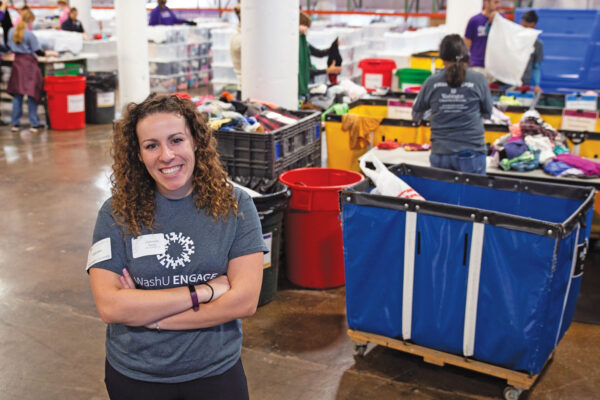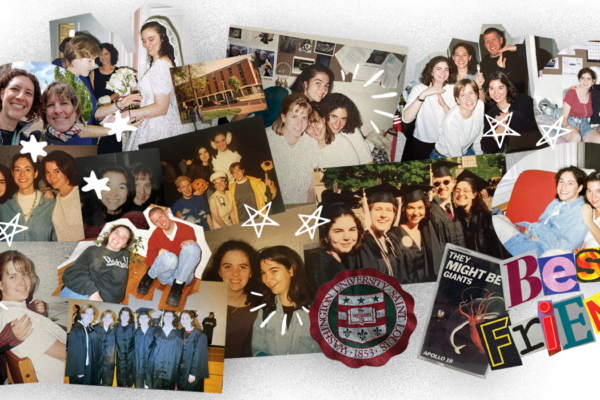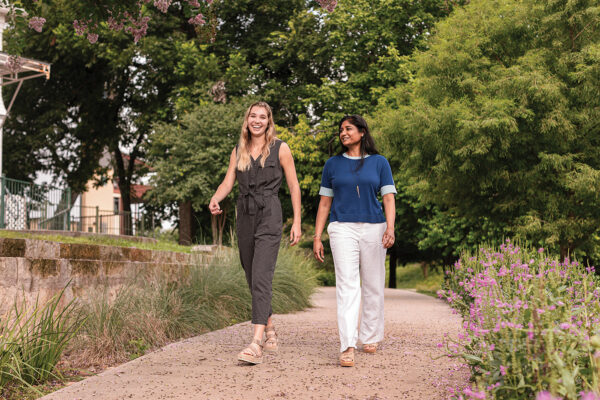
When Alex Carroll, AB ’73, earned his bachelor’s degree in sociology in 1973, he was, at the time, part of Washington University’s largest graduating class of Black students. A decade later, he returned to campus for reunion with the idea to honor his pioneering Class of 1973 by forming a new organization dedicated to WashU’s Black alumni.
Through the help of Cynthia Cosby, AB ’93, then an administrator in the African-American Studies program, and others, the group formally became the Washington University Black Alumni Council (BAC) in spring 1983.
Today, the BAC remains true to its founding mission to support the -professional and personal development of Black alumni, assist with recruitment and retention of Black students, and enhance the continued growth of the university. As it hits the big 4-0 this year, the council looks to boost engagement across generations and geography, and help Black alumni cultivate meaningful relationships with each other and their alma mater.
Wherever you are
There are 8,000-plus Black WashU alumni worldwide and many more current students, parents and friends. In recent years, the BAC has expanded its footprint beyond St. Louis to reach more of this thriving Black community. The council now has chapters in Chicago, New York, San Francisco, St. Louis and Washington, D.C., and will introduce an affiliate in Atlanta in 2024.
Jared Joiner, AB ’05, played a key role in helping the BAC build a presence in the San Francisco Bay Area. Friend and fellow alum Cassidy Blackwell, AB ’06, first approached him about signing on as chapter co-chair in the summer of 2019. He viewed the offer as an opportunity to reconnect with WashU while also developing the kind of alumni programming he had been searching for since moving to San Francisco four years earlier.
“I was interested in bringing together the area’s Black alumni in more unique ways,” Joiner says. To him, that meant events with a mix of fun and substance. The chapter’s fall 2019 kickoff party, for instance, went beyond the usual cocktails, canapés and conversation. Partygoers were treated to a professional photographer taking LinkedIn-style headshots and were invited to offer programming ideas via colorful Post-its.
So far, the Bay Area chapter has hosted a range of activities, including a tour of the Soul of a Nation: Art in the Age of Black Power 1963-1983 exhibition at the de Young Museum. The group also visited a Black-owned winery and a restaurant run by a former Top Chef competitor. “Supporting Black businesses throughout the region is a goal for our chapter,” Joiner says.
Years ago, while volunteering as a mock interviewer at a WashU Career Center Road Show in San Francisco, he noticed few Black students had traveled from St. Louis for the event. That experience — along with his work promoting educational equity at the Chan Zuckerberg Initiative — continues to motivate Joiner’s BAC involvement. He would like to see the Career Center further engage with today’s Black students and young alumni, especially those considering relocating to the Bay Area, by partnering with the BAC and the Association of Black Students.
Come young, come all
Supporting current WashU students and recent grads is a top priority for the broader BAC moving forward. The council established the BAC Emergency Fund in 1989 and has since generated nearly $156,000 for students with unanticipated financial needs. In 1995, the group created the BAC Endowed Scholarship Fund, which has raised approximately $222,000 and supported more than 20 students.
“I want them to know they have a place at WashU.”
Marissa Cohen, MSW ’17
But there is more work to be done, and that includes outreach to graduate students and graduate alumni like Marissa Cohen, MSW ’17. After earning a master’s degree in social work, Cohen remained in St. Louis and stayed up to date on alumni events in the area. Yet she felt somewhat disconnected from the alumni community as a Brown School grad. “I wasn’t sure where graduate alumni like me fit in,” she says.
Cohen’s place at WashU has become clearer since 2021, when a WashU Alumni Association staff member reached out about getting involved with the BAC in St. Louis. Over the past two years, Cohen has been instrumental in the chapter’s efforts to increase engagement among all young alumni. “I want them to know they have a place at WashU,” she says.
Additional opportunities for community service and career networking are in the works, says Cohen. Above all, she seeks to carry on the BAC legacy in St. Louis by helping forge a stronger, more diverse community that includes members from different classes, schools and programs.
Just the beginning
Neither Joiner nor Cohen was very active with WashU before taking on leadership roles in the BAC, but both have found themselves inspired to delve deeper. The council lit a spark in them, and Lori Davis-West, AB ’84, believes it can do the same for future generations. A WashU alumna and current parent, Davis-West is a longtime member of the Alumni and Parents Admission Program and sits on the national council for the Gephardt Institute for Civic and Community Engagement. Three years ago, she added BAC New York co-chair to her résumé.
“It’s a space where Black alumni can connect with each other while also deepening their ties to the university overall.”
Lori Davis-West, AB ’84
Davis-West’s busy volunteer slate mirrors her undergraduate years, when she was a resident adviser and captain of the women’s track and field team. Through these co-curricular activities, she found community and developed life skills. She regards alumni groups like the BAC as offering much the same. For Davis-West, the council is not an endpoint but rather an entry point to engagement with WashU. “It’s a space where Black alumni can connect with each other while also deepening their ties to the university overall,” she says.
There are now six WashU alumni in Davis-West’s family, including daughter Chloe West, AB ’23. Her son, Max West, will join the Class of 2027 in the fall. She says it is critical that WashU’s youngest generations understand the value of the alumni community and groups like the BAC. “There will be times in life when you need support,” she says. “The council will be there for you then, and we’re here now.”


